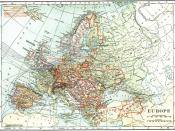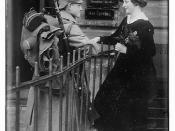The transition from full out total war to peace was for many people and even countries very tumultuous. Many millions of families had lost sons and husbands and countries had lost many millions of workers. Mostly all of the war belligerents were in economic devastation except for the USA who saw a great economic boom during the early and middle 20's due to the enormous amounts of money Britain and France owed them from during the war.
The post war period after WWI (1914-1919) was a time full of treaties and pacts. The most famous post war treaty is the one that took place in Versailles 1919. The leaders of the four "war victors" were all present at this treaty, including W. Wilson, president of the USA, D. Lloyd George, PM of Britain, Clemenceau, PM of France and Orlando, PM of Italy. Many people argue that Versailles was a Carthaginian treaty, that it
destroyed the German economy and Germany as a country.
Wilson wanted to abide by the 14 points that he and his administration had set up during the last year of the war. These 14 points consisted of guidelines set up to ensure "a peace safe for democracy" as Wilson put it and ensure that there would be "peace without victors". This was to make sure that Germany would not be totally destroyed. Clemenceau on the other hand wanted to punish Germany and weaken them to such degree that it would be impossible for them to ever act aggressively towards France again. Lloyd George's position was somewhere in between the two mentioned. He would like to see Germany punished but not to a degree of destruction. Also decided during the Versailles was that Germany would lose all her colonies, Poland would be recreated and there would be a...


